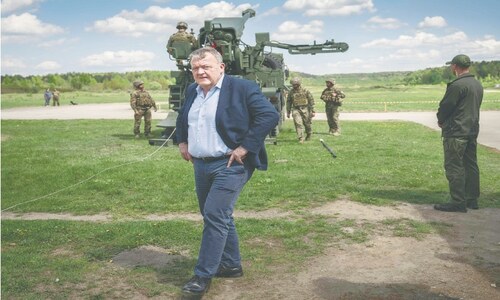WASHINGTON, March 15: The US commander in Afghanistan said on Tuesday that much of the Taliban's battlefield momentum has been halted, putting the US on course to begin pulling out troops in July and shifting security responsibility to the Afghans.
In testimony to the Senate Armed Services Committee, Gen David Petraeus cautioned that security progress is still “fragile and reversible,” with much difficult work ahead as the Taliban launch an expected spring offensive. It was the general's first testimony on the war since he took command in Kabul last summer.He said he supports President Barack Obama's plan to begin reducing the number of US troops in July; he said he would prepare options for that and make a recommendation to Obama.
“The momentum achieved by the Taliban in Afghanistan since 2005 has been arrested in much of the country and reversed in a number of important areas,” Petraeus said. “However, while the security progress achieved over the past year is significant, it is also fragile and reversible.”
Petraeus is balancing his troops' solid progress in combat with worries about Kabul government corruption, an expected Taliban resurgence this spring and the slow development of Afghan security forces.
Testifying alongside the general, the Pentagon top civilian policy official, Michele Flournoy, said, “Our strategy is working.” She said US, Nato and Afghan forces are regaining critical territory and wresting the initiative from the insurgents.In remarks at the hearing's outset, Sen John McCain, the committee's top Republican, said that he is encouraged by progress in the war, although concerned that the fighting will become more intense this spring and summer.
“Nato forces will surely face a renewed Taliban offensive this spring to retake the territory and momentum they have lost on the battlefield — and those losses have been considerable,” McCain said.
“US, Nato, and Afghan Special Forces have dealt a crushing blow to the midlevel leadership of the Taliban and its Al Qaeda allies.”
Petraeus said that the substantial military gains could be jeopardised unless Congress provides adequate funding to the State Department and the US Agency for International Development to provide economic development, governance and other civilian assistance.
“I am concerned that levels of funding for our State Department and USAID partners will not sufficiently enable them to build on the hard-fought security achievements of our men and women in uniform,” he said.
Petraeus, who met Obama on Monday, claims the US, Afghan and allied forces have been able to substantially oust the Taliban from historical strongholds, particularly in the south. He is beginning to sketch out how the Afghan forces can slowly begin taking control in more stable locales as US troops shift to still precarious regions.
“The situation on the ground will almost certainly be the most promising part of the story that Gen Petraeus can tell,” said Karl F. Inderfurth, a former senior State Department diplomat for South Asia. He said other difficult struggles will determine success, including the reconciliation process with more moderate Taliban, establishment of a more capable government and the effort to persuade the Afghan people.
A topic of continued debate will be the militants' safe havens along the mountainous Pakistan border, and Islamabad's reluctance to move into insurgent strongholds in North Waziristan — where senior Al Qaeda leaders, including Osama bin Laden, are rumored to be hiding.
Members of Congress, meanwhile, will roll out a resolution calling for Obama to withdraw US forces from Afghanistan either in 30 days or no later than Dec 31. While the measure has failed in the past and is almost certain to fail again, the debate will underscore Congress' impatience with the war in the face of increasing budget pressure. —AP
















































Dear visitor, the comments section is undergoing an overhaul and will return soon.